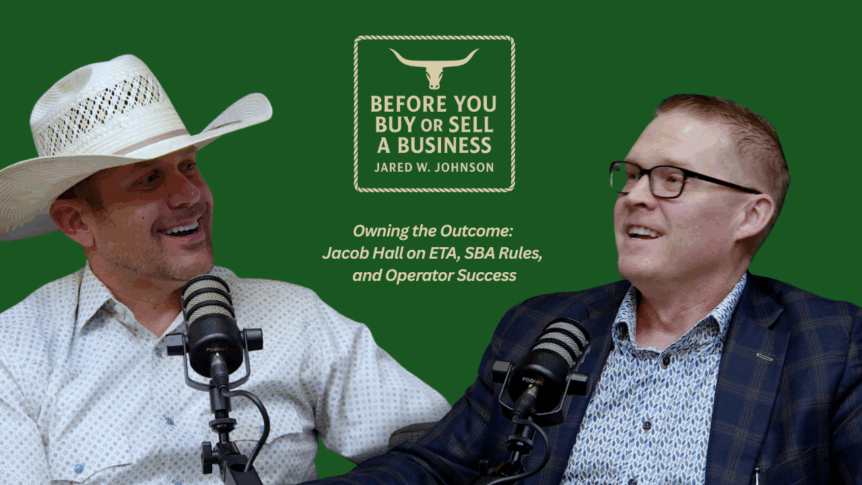Before You Buy or Sell a Business Podcast – Hosted by Jared Johnson
Closing on a business is only the beginning. Real success depends on how you manage the first years of ownership, the capital you bring to the table, and the partners you choose. In Episode 53 of the Before You Buy or Sell a Business podcast, host Jared W. Johnson talks with Jacob Hall, Founder and Managing Partner of Kando Capital, about the realities of Entrepreneurship Through Acquisition (ETA) and how to succeed as both an operator and investor.
Jacob shares how his background as an engineer and operator shaped his approach to working with self-funded searchers and independent sponsors. He explains why search can be a double edged sword, why alignment between investors and operators is essential, and how his firm structures equity to support both liquidity and long term ownership.
From Engineering to Entrepreneurship Through Acquisition
Jacob’s career began in engineering and corporate operations before he moved into leadership roles as a small business COO. In 2020 he discovered ETA and shifted from searching for a business to investing in entrepreneurs. His operational experience gave him insight into what operators truly need post-close, from managing working capital to building leadership teams.
At Kando Capital, Jacob and his partners raise capital from accredited investors and family offices to support operators pursuing acquisitions. Their approach emphasizes not only funding but also providing networks, strategy, and guidance.
Why Alignment Between Investors and Operators Matters
One of the strongest themes of the episode is alignment. Jacob explains that investors and operators must be on the same page about hold periods, liquidity preferences, and growth strategy. Misalignment leads to tension that can derail both the business and the partnership.
Kando Capital structures equity deals to balance near-term liquidity opportunities with long-term ownership potential. This ensures operators have both the motivation and the support needed to drive growth. Jacob highlights that transparency, communication, and trust are essential for building strong operator-investor relationships.
The J Curve and Working Capital Challenges
Jacob warns that many new owners underestimate the challenges of the first year after closing. The J curve is a common phenomenon where cash flow dips before stabilizing or improving. Without planning for this, operators can quickly find themselves under pressure.
Working capital is another underestimated factor. Owners must have enough cash available for payroll, vendor payments, and unexpected expenses. Jacob emphasizes that underfunded working capital is one of the most common mistakes new buyers make. Preparing for it upfront reduces stress and prevents early stumbles.
Teaching and Mentorship in ETA
Mentorship has played a significant role in Jacob’s own career. Now, he is paying that forward by teaching ETA at the University of Texas. His goal is to prepare the next generation of operators by sharing lessons on alignment, capital structure, and the realities of running small businesses.
By contributing to the ETA community, Jacob hopes to foster transparency and build a network where investors and operators can learn from each other.
Key Takeaways from the Episode
- ETA requires commitment, maturity, and resilience from operators and investors
- Alignment between investors and operators sets clear expectations and prevents conflict
- The J curve is common in the first year and must be accounted for in planning
- Working capital is critical to avoid liquidity issues post-close
- Equity partners provide more than money, including strategy, networks, and support
- Mentorship and community help operators overcome challenges and grow stronger
Why This Conversation Matters
Jacob Hall’s perspective bridges the gap between investors and operators. With his operational background, he understands what entrepreneurs face after closing and what they need to succeed. His insights into equity structures, and alignment offer practical guidance for anyone pursuing ETA.
This episode is a reminder that acquisitions are not only financial transactions but also long-term partnerships. The right capital partners and the right planning can make the difference between struggling through the first year and building a business that thrives.
Listen to the Full Episode
You can stream Episode 53, Owning the Outcome: Jacob Hall on ETA, and Operator Success, on the Before You Buy or Sell a Business podcast or wherever you listen to podcasts.
For more insights on ETA investing, and small business acquisitions, visit Jared W. Johnson’s website.

